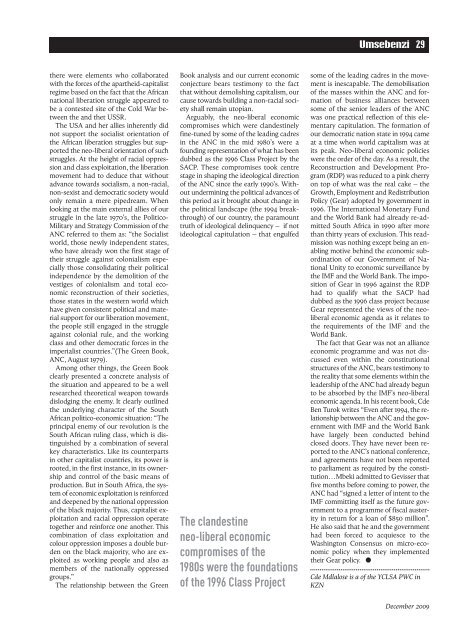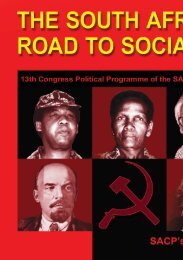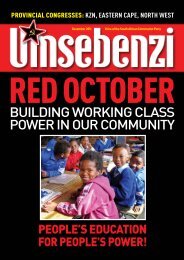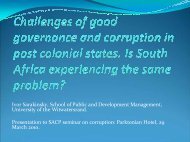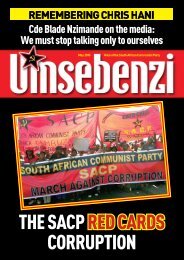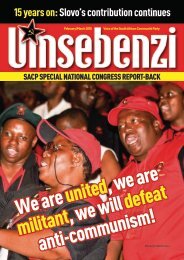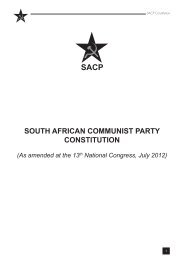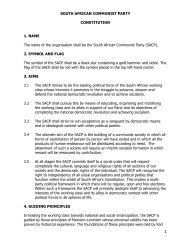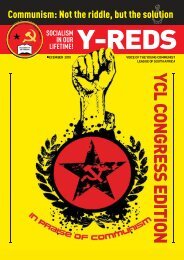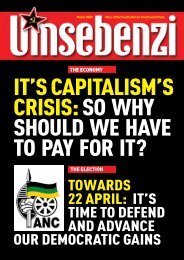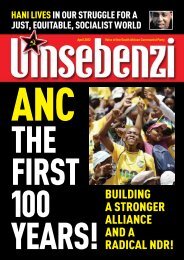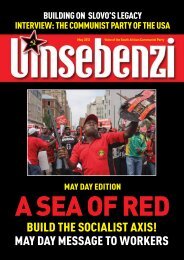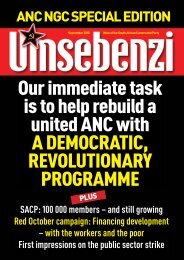Forward to Socialism!! - South African Communist Party
Forward to Socialism!! - South African Communist Party
Forward to Socialism!! - South African Communist Party
You also want an ePaper? Increase the reach of your titles
YUMPU automatically turns print PDFs into web optimized ePapers that Google loves.
Umsebenzi 29<br />
there were elements who collaborated<br />
with the forces of the apartheid-capitalist<br />
regime based on the fact that the <strong>African</strong><br />
national liberation struggle appeared <strong>to</strong><br />
be a contested site of the Cold War between<br />
the and thet USSR.<br />
The USA and her allies inherently did<br />
not support the socialist orientation of<br />
the <strong>African</strong> liberation struggles but supported<br />
the neo-liberal orientation of such<br />
struggles. At the height of racial oppression<br />
and class exploitation, the liberation<br />
movement had <strong>to</strong> deduce that without<br />
advance <strong>to</strong>wards socialism, a non-racial,<br />
non-sexist and democratic society would<br />
only remain a mere pipedream. When<br />
looking at the main external allies of our<br />
struggle in the late 1970’s, the Politico-<br />
Military and Strategy Commission of the<br />
ANC referred <strong>to</strong> them as: “the Socialist<br />
world, those newly independent states,<br />
who have already won the first stage of<br />
their struggle against colonialism especially<br />
those consolidating their political<br />
independence by the demolition of the<br />
vestiges of colonialism and <strong>to</strong>tal economic<br />
reconstruction of their societies,<br />
those states in the western world which<br />
have given consistent political and material<br />
support for our liberation movement,<br />
the people still engaged in the struggle<br />
against colonial rule, and the working<br />
class and other democratic forces in the<br />
imperialist countries.”(The Green Book,<br />
ANC, August 1979).<br />
Among other things, the Green Book<br />
clearly presented a concrete analysis of<br />
the situation and appeared <strong>to</strong> be a well<br />
researched theoretical weapon <strong>to</strong>wards<br />
dislodging the enemy. It clearly outlined<br />
the underlying character of the <strong>South</strong><br />
<strong>African</strong> politico-economic situation: “The<br />
principal enemy of our revolution is the<br />
<strong>South</strong> <strong>African</strong> ruling class, which is distinguished<br />
by a combination of several<br />
key characteristics. Like its counterparts<br />
in other capitalist countries, its power is<br />
rooted, in the first instance, in its ownership<br />
and control of the basic means of<br />
production. But in <strong>South</strong> Africa, the system<br />
of economic exploitation is reinforced<br />
and deepened by the national oppression<br />
of the black majority. Thus, capitalist exploitation<br />
and racial oppression operate<br />
<strong>to</strong>gether and reinforce one another. This<br />
combination of class exploitation and<br />
colour oppression imposes a double burden<br />
on the black majority, who are exploited<br />
as working people and also as<br />
members of the nationally oppressed<br />
groups.”<br />
The relationship between the Green<br />
Book analysis and our current economic<br />
conjecture bears testimony <strong>to</strong> the fact<br />
that without demolishing capitalism, our<br />
cause <strong>to</strong>wards building a non-racial society<br />
shall remain u<strong>to</strong>pian.<br />
Arguably, the neo-liberal economic<br />
compromises which were clandestinely<br />
fine-tuned by some of the leading cadres<br />
in the ANC in the mid 1980’s were a<br />
founding representation of what has been<br />
dubbed as the 1996 Class Project by the<br />
SACP. These compromises <strong>to</strong>ok centre<br />
stage in shaping the ideological direction<br />
of the ANC since the early 1990’s. Without<br />
undermining the political advances of<br />
this period as it brought about change in<br />
the political landscape (the 1994 breakthrough)<br />
of our country, the paramount<br />
truth of ideological delinquency – if not<br />
ideological capitulation – that engulfed<br />
The clandestine<br />
neo-liberal economic<br />
compromises of the<br />
1980s were the foundations<br />
of the 1996 Class Project<br />
some of the leading cadres in the movement<br />
is inescapable. The demobilisation<br />
of the masses within the ANC and formation<br />
of business alliances between<br />
some of the senior leaders of the ANC<br />
was one practical reflection of this elementary<br />
capitulation. The formation of<br />
our democratic nation state in 1994 came<br />
at a time when world capitalism was at<br />
its peak. Neo-liberal economic policies<br />
were the order of the day. As a result, the<br />
Reconstruction and Development Program<br />
(RDP) was reduced <strong>to</strong> a pink cherry<br />
on <strong>to</strong>p of what was the real cake – the<br />
Growth, Employment and Redistribution<br />
Policy (Gear) adopted by government in<br />
1996. The International Monetary Fund<br />
and the World Bank had already re-admitted<br />
<strong>South</strong> Africa in 1990 after more<br />
than thirty years of exclusion. This readmission<br />
was nothing except being an enabling<br />
motive behind the economic subordination<br />
of our Government of National<br />
Unity <strong>to</strong> economic surveillance by<br />
the IMF and the World Bank. The imposition<br />
of Gear in 1996 against the RDP<br />
had <strong>to</strong> qualify what the SACP had<br />
dubbed as the 1996 class project because<br />
Gear represented the views of the neoliberal<br />
economic agenda as it relates <strong>to</strong><br />
the requirements of the IMF and the<br />
World Bank.<br />
The fact that Gear was not an alliance<br />
economic programme and was not discussed<br />
even within the constitutional<br />
structures of the ANC, bears testimony <strong>to</strong><br />
the reality that some elements within the<br />
leadership of the ANC had already begun<br />
<strong>to</strong> be absorbed by the IMF’s neo-liberal<br />
economic agenda. In his recent book, Cde<br />
Ben Turok writes “Even after 1994, the relationship<br />
between the ANC and the government<br />
with IMF and the World Bank<br />
have largely been conducted behind<br />
closed doors. They have never been reported<br />
<strong>to</strong> the ANC’s national conference,<br />
and agreements have not been reported<br />
<strong>to</strong> parliament as required by the constitution…Mbeki<br />
admitted <strong>to</strong> Gevisser that<br />
five months before coming <strong>to</strong> power, the<br />
ANC had “signed a letter of intent <strong>to</strong> the<br />
IMF committing itself as the future government<br />
<strong>to</strong> a programme of fiscal austerity<br />
in return for a loan of $850 million”.<br />
He also said that he and the government<br />
had been forced <strong>to</strong> acquiesce <strong>to</strong> the<br />
Washing<strong>to</strong>n Consensus on micro-economic<br />
policy when they implemented<br />
their Gear policy.<br />
Cde Mdlalose is a of the YCLSA PWC in<br />
KZN<br />
December 2009


